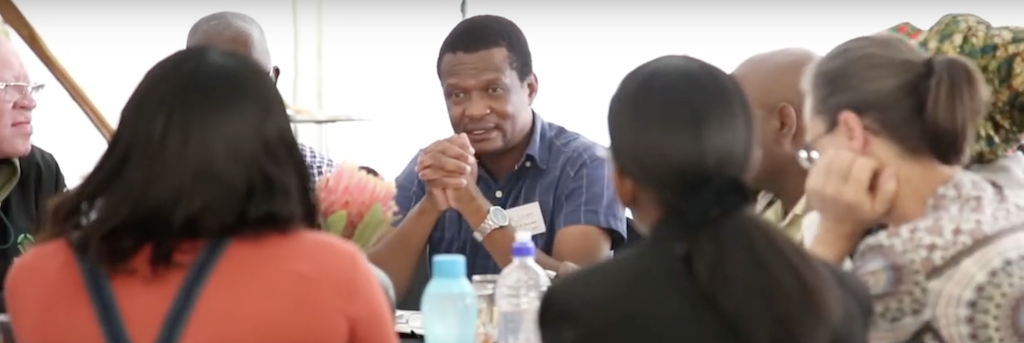Latest Resources

13 March 2019
Experiences of FISP: Farm Input Subsidy Programmes in Africa
In August 2018, the Rural Women’s Assembly (RWA) and the African Centre for Biodiversity (ACB) hosted a speak-out for SADC smallholder farmers in Windhoek, Namibia, on Farm Input Subsidy Programmes (FISPs). FISPs are government agricultural programmes that promote the use of Green Revolution inputs produced by multinational corporations. Farmers were not properly consulted about their […]

5 March 2019
WHY FARMERS FIND FISP PROBLEMATIC (Part 1 of 4 videos)
In August 2018, The Rural Women’s Assembly (RWA) and the African Centre for Biodiversity (ACB) hosted a speak-out with SADC smallholder farmers in Windhoek, Namibia, on Farm Input Subsidy Programmes (FISPs). FISPs are government agricultural programmes to promote the use of Green Revolution inputs (hybrid seed, synthetic fertilizer and agro-chemicals) produced by multinational corporations. WHY […]

18 June 2018
Agroecology points the way towards resilience against climate change
This week the water-stressed city of Cape Town hosts the bi-annual Adaptation Futures conference, where scientists, business leaders, and practitioners from the world of development and agriculture will come together to engage in ‘dialogues for solutions’ to the multifarious problems wrought by our rapidly changing climate. As actors with different perspectives design modes of collaboration, […]

31 May 2018
Participatory Plant Breeding and Smallholder Farmers
The National Seed Dialogue and Celebration was hosted by the African Centre for Biodiversity at Constitution Hill in December 2017. The third video in this series, Participatory Plant Breeding and Smallholder Farmers looked at issues of smallholder farmers & seed breeding/crop improvement and the potential roles of smallholder farmers in these processes were discussed. Since […]

23 March 2018
Seed policy paper: Towards national and regional seed policies in Africa that recognise and suppo...
The African Centre for Biodiversity (ACB) has prepared this policy discussion document as a contribution towards national and regional seed policies in Africa that recognise and support farmer seed systems. The document is an effort to synthesise the policy issues emerging from our research and advocacy work on farmer seed systems in the past few […]

1 March 2018
A review of participatory plant breeding and lessons for African seed and food sovereignty movements
There is growing awareness of the unique and important role smallholder farmers around the world play in conserving, using and enhancing biodiversity. Conventional breeding has created a separation between farmers and specialised breeders. Participatory plant breeding (PPB) is a field of action developed over the past 25-30 years to overcome this separation, and reunite farmers […]

13 November 2017
Smallholder farmers score victory at international ‘Seed Treaty’ meeting
A landmark decision on the establishment of an Ad Hoc Technical Expert Group to realise farmers’ rights was recently taken by the seventh session of the Governing Body (GB7) of the International Treaty on Plant Genetic Resources for Food and Agriculture (ITPGRFA; also known as the ‘Seed Treaty’). There was stiff opposition from countries from […]

16 October 2017
GM cotton in Africa: battleground between US and Chinese Capital
This paper provides an overview of the GM cotton push in in East and Southern Africa, within the context of the global and regional cotton markets.

27 September 2017
Seed sovereignty for Peasant Farmers in Malawi blocked by emerging national seed policy
The government of Malawi is poised to adopt a draconian National Seed Policy that blocks peasant farmers’ opportunities to secure and strengthen farmer-managed seed systems (FMSS), and which would undermine farmers’ rights and the International Treaty on Plant Genetic Resources for Food and Agriculture, to which Malawi is a Party. An ad hoc stakeholder policy […]

1 September 2017
WEMA Project shrouded in secrecy: open letter to African governments to be accountable to farmers...
The Water Efficient Maize for Africa (WEMA) project promises to develop drought tolerance in maize for the benefit of small holder farmers, but is really a project designed to facilitate the spread of hybrid and genetically modified (GM) maize varieties on the continent. WEMA involves five African countries: Kenya, Mozambique, South Africa, Tanzania and Uganda. […]
